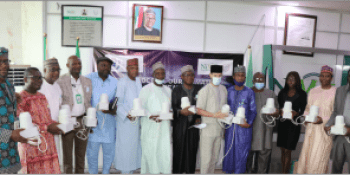Collaboration brings focused agricultural advice to farmers in Ha Tinh, Vietnam

Locally specific weather forecasts and agricultural advice are expected to help farmers in Vietnam better adapt to increasingly variable weather.
For the first time, members of the Farmers’ Union in Ha Tinh province, officials from the Ha Tinh Provincial Center for Hydro-meteorological Forecasting and the Department of Agriculture and Rural Development (DARD) met to prepare a seasonal agricultural advisory for farmers in the province. The advisory note would include information on how to adapt their agricultural activities to the changes in the climate.
In a new blog story on the World Agroforestry Centre (ICRAF) website, Elisabeth Simelton gives insight into the discussions of the meeting.
During the meeting, the provincial meteorological staff members were trained by a colleague from the National Institute of Meteorology, Hydrology and Climate Change in creating seasonal forecasts, while the agricultural technicians, extension workers and farmers learned about the impacts of climate and weather on crop development and climate-smart agriculture (CSA).

Elisabeth Simelton (standing, right), ICRAF researcher working with CCAFS, and workshop participants discussing a sample agricultural advisory. Photo: Le Van Hai (World Agroforestry Centre)
The participants saw this as an opportunity to learn and share their experiences in climate change and agriculture. The meeting also helped them identify how to adapt to climate change, and which CSA practices would be appropriately implemented in their province.
After the training sessions, the participants discussed the forecast for the summer season and how to address the foreseen challenges for the farmers. They also looked at how they could give the minimum information the farmers needed in a way that both male and female farmers could understand.
The advisory note completed by a technical group formed by farmers and staff from DARD and the Center for Hydro-meteorological Forecasting will be posted on the My Loi village information boards. At a meeting with the members of the village CSA action groups, the farmers developed a participatory plan based on the two to three most probable seasonal forecast scenarios.
“These meetings become an interesting melting pot of farmers' knowledge and the so-called technical forecast,” said Hai Van Le who facilitates the village meetings.
After the harvest, the technical group will meet again to evaluate the advice they gave. It is intended that they will continue developing advisories for the coming seasons, thus, the group is testing different designs with the farmers to see which would be the best format for future advisories.
The research team working on the project is also collaborating with local authorities and donors to assess the cost and benefits of such agricultural advisories targeted for farmers.
This collaboration is part of the project, ‘Enhancing the adaptive capacity of women and ethnic minority smallholder farmers through improved agro-climate information in Southeast Asia’, which is implemented by the World Agroforestry Centre (ICRAF) and CARE International in Vietnam, Lao PDR and Cambodia. Supported by the CGIAR Research Program on Climate Change, Agriculture and Food Security (CCAFS), the project aims to use scientific and local knowledge in providing agro-climatic information to smallholder farmers, especially women and ethnic minorities.
This is an excerpt of the original blog story, Viet Nam learning the importance of weather forecasts with agricultural advice, first published on the World Agroforestry Centre (ICRAF) blog.
Read more:
- Weather information systems too complicated for farmers?
- Barren no more: farmers restore forest landscape
- Worms as nutrients for animals and soil
Amy Cruz is the junior communications specialist for the World Agroforestry Centre Philippines. She is also a communication consultant with the CCAFS SEA program.



